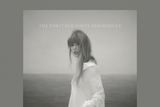The great elder statesman of song - Leonard Cohen
Swan song: The 82-year-old Leonard Cohen has long been admired for the brilliance of his verse which can survive being divorced of its music and held up to scrutiny on its own
When news broke that Bob Dylan had become the first singer-songwriter to win the Nobel Prize for Literature, I can't have been the only one to ponder who else among Dylan's peers could have been a contender for the most prestigious literary gong of them all.
You could make the case for Jimmy Webb, although he's better known for gifting songs to others, and there's extraordinary wisdom in the work of Randy Newman. Yet, it's difficult to look beyond a man older than the lot - and still very much with us: Leonard Cohen.
The 82-year-old has long been admired for the brilliance of his verse - which, like Dylan, can survive being divorced of its music and held up to scrutiny on its own. Even really good lyricists sometimes struggle to be taken seriously as poets when you see their words written down in black and white. Not so with Cohen - his words bear the hallmark of being meticulously chosen, yet rarely if ever feeling laboured over.
Of course, this is a man who was known as a poet and writer long before he first went into a recording studio. He published a collection of poetry, Let Us Compare Mythologies, in 1956 - a full 11 years before he released his debut album, Songs of Leonard Cohen.
He would continue to publish volumes of verse concurrently with his music, including 1984's Book of Mercy, generally thought to be the finest of his collections. That was also the year he released his Various Positions album, the one that featured 'Hallelujah', staple for singer-songwriters everywhere.
He also wrote novels before his music took off, including a bildungsroman, The Favourite Game (1964), that was rejected by his publisher as "tedious and preoccupied with sex". (A carnal fixation would characterise his work well into old age.)
Cohen was 33 when his first album came out in 1967 - positively geriatric when compared with Dylan who, at seven years his junior, was on his eighth album, John Wesley Harding. It was generously praised at the time and has now come to be seen as a milestone recording that influenced enough singer-songwriters to pack Whelan's out several times over.
Fast-forward almost 50 years and Cohen is back with what he has hinted may be his final album. And what an extraordinary album, You Want It Darker, is. One of 2016's most indispensable, it finds a man, apparently in ailing health, casting a cold eye back over a remarkable life.
Produced by his son, Adam, it's shot through with humour and pathos and insight. It surprises and delights and makes you sad, especially in those moments when he seems to face up to his own death: "I'm ready, my lord," he speaks-sings on the masterful title track, and while the vocals are assured and steady there's an underlying frailty there, too.
"I'm ready to die," he told the acclaimed US journalist and writer David Remnick just a few weeks ago. Yet, soon afterwards, he was in a more playful, defiant mood. "I said recently I was ready to die and I think I was exaggerating," he said, according to Billboard. "I've always been into self-dramatisation. I intend to live forever." He even alluded to the fact that he was working on two more album projects.
If Cohen's recording career started comparatively late in life, so, too, did his comeback, which - with the benefit of hindsight - has been one of the most remarkable late flowerings in music history. 2001's Ten New Songs was his first album in nine years and was quickly followed by 2004's Dear Heather. Both featured significant contributions from Sharon Robinson and offered a reminder of how much of a role some women have played in his life, not least Jennifer Warnes who guested on several of his albums in the 1970s and 80s. (Incidentally, Warnes' Famous Blue Raincoat, from 1987, remains one of the greatest covers albums ever recorded.)
Since 2012, there have been three albums: Old Ideas, Popular Problems and, now, You Want It Darker.
And while the quality control has been kept inflated in the recording studio, he took his live show to a new level from 2008 on. He was essentially forced to tour again after 15 years having suffered financial embezzlement to the tune of $5m at the hands of an advisor. And in that world tour of 2008-10, the then-septuagenarian played 247 shows.
For Irish fans, his first Irish concert in two decades at Dublin's Royal Hospital Kilmainham will forever live in the memory. For this writer, it remains the show by which all others are judged. Cohen was in marvellous form, his voice a thing of rare beauty. He was accompanied by an exemplary band whose number included a pair of English siblings on backing vocals that he introduced as "the sublime Webb sisters".
It was one of those gorgeously balmy summer evenings, too, when an outdoor gig in old Dublin 8 seemed like one of the most pleasant things in the world.
For Irish devotees who had to wait 20 years to see Cohen play this country, he could hardly be kept out such was the frequency with which he came back. Two years after Kilmainham, he performed at Lissadell House, Co Sligo - a place forever associated with WB Yeats, who, along with American poet Walt Whitman, arguably influenced Cohen more than any songwriter.
And then there was a pair of wonderful shows in Dublin's then O2 in 2013, much of which was captured on the Live in Dublin album. If anything his vocals sounded even richer than before.
Given his age and reports of his health, it's unlikely we'll see him in concert again (although 87-year-old Ennio Morricone is still touring with his orchestra), but what a legacy he's left behind.
You Want it Darker is out now
Join the Irish Independent WhatsApp channel
Stay up to date with all the latest news














